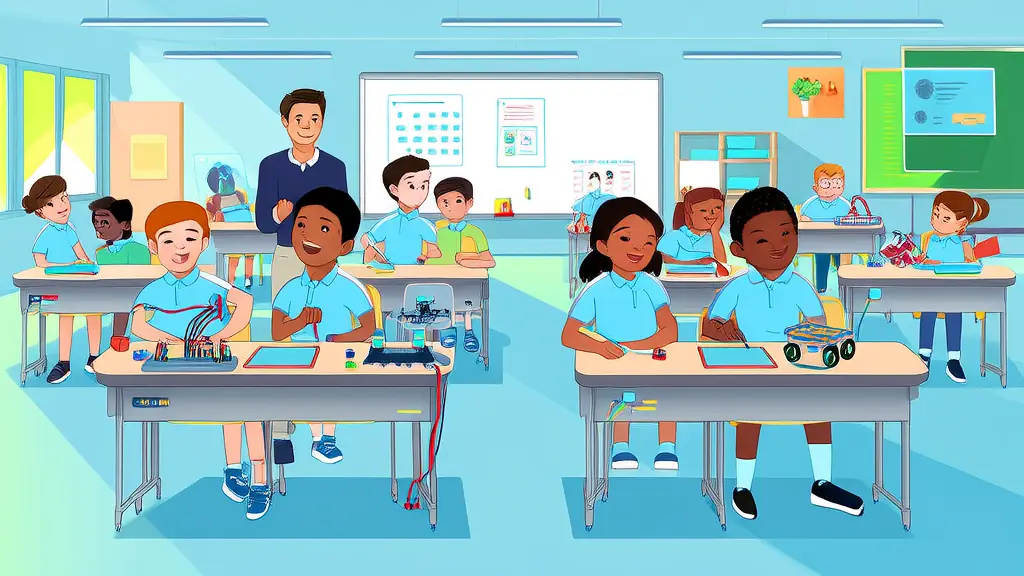
Empowering the Next Generation: Navigating K12 Education in 2025
As we stand at the threshold of a new era, the landscape of K12 education is evolving rapidly. From innovative teaching methodologies to cutting-edge educational technology, the goal remains the same: to provide our children with the best possible learning experience. In this blog post, we will explore the latest trends, research, and practical tips that can help parents and educators support the development of young minds. Let's dive in!
The Rise of Personalized Learning
One of the most significant shifts in K12 education is the move towards personalized learning. This approach recognizes that each child has unique strengths, weaknesses, and learning styles. By tailoring instruction to meet individual needs, educators can enhance engagement and improve academic outcomes.
Example: The Summit Learning Platform, used by over 380 schools across the United States, offers a personalized learning experience. Students set goals, track their progress, and receive real-time feedback, leading to increased motivation and better performance.
Actionable Advice for Teachers: Incorporate formative assessments and use data to adjust your teaching strategies. Encourage students to set personal learning goals and provide them with the tools and resources they need to achieve those goals.
Actionable Advice for Parents: Stay involved in your child's education by regularly checking in on their progress and discussing their learning goals. Provide a supportive home environment that encourages curiosity and self-directed learning.
Child Development Insights and Research
Recent research in child development has shed light on the importance of social-emotional learning (SEL) and its impact on academic success. SEL helps students develop essential skills such as self-awareness, self-management, social awareness, relationship skills, and responsible decision-making.
Example: The Collaborative for Academic, Social, and Emotional Learning (CASEL) has developed a framework that many schools are adopting. Schools that integrate SEL into their curriculum have seen improvements in student behavior, attendance, and academic achievement.
Actionable Advice for Teachers: Integrate SEL activities into your daily lessons. Use class meetings to discuss feelings, practice empathy, and build a positive classroom culture. Collaborate with school counselors and psychologists to create a comprehensive SEL program.
Actionable Advice for Parents: Talk to your child about their emotions and encourage them to express themselves. Model healthy coping mechanisms and problem-solving skills. Engage in activities that promote teamwork and communication, such as family game nights or community service projects.
Educational Technology Trends
Technology continues to play a crucial role in K12 education, offering new ways to engage students and enhance learning. Some of the latest trends include virtual reality (VR), augmented reality (AR), and artificial intelligence (AI).
Example: Google Expeditions allows teachers to take their students on virtual field trips, providing immersive experiences that bring history, science, and other subjects to life. AI-powered tutoring systems like Carnegie Learning offer personalized math instruction, helping students master complex concepts.
Actionable Advice for Teachers: Explore educational apps and platforms that align with your curriculum. Consider using VR and AR to create engaging and interactive lessons. Stay informed about the latest edtech tools and participate in professional development opportunities to enhance your tech skills.
Actionable Advice for Parents: Monitor your child's screen time and ensure they are using technology for educational purposes. Encourage them to explore educational apps and websites that can supplement their learning. Discuss the ethical use of technology and the importance of digital citizenship.
Success Stories and Case Studies
Seeing the impact of these innovations in action can be incredibly inspiring. Here are a few success stories and case studies that highlight the effectiveness of modern K12 education practices.
Case Study 1: The Khan Academy Impact - Background: Khan Academy provides free, world-class education for anyone, anywhere. - Results: A study by SRI International found that students who used Khan Academy for math instruction showed significant gains in test scores and improved attitudes toward learning. - Takeaway: Free, high-quality online resources can be a powerful tool for both teachers and students.
Case Study 2: The Power of Project-Based Learning (PBL) - Background: PBL is an instructional approach where students learn by working on real-world projects. - Results: A study by the Buck Institute for Education found that PBL led to higher levels of student engagement, deeper understanding of content, and improved critical thinking skills. - Takeaway: Hands-on, real-world projects can make learning more meaningful and effective.
Conclusion
As we navigate the ever-evolving landscape of K12 education, it is clear that personalized learning, social-emotional development, and educational technology are key components of a successful educational experience. By staying informed and embracing these trends, parents and educators can work together to empower the next generation of learners.
Call to Action: Share your own experiences and insights in the comments below. Together, we can continue to shape the future of education and ensure that every child has the opportunity to thrive.